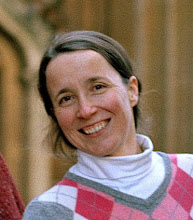The clear bead at the centre changes everything.
There are no edges to my loving now.
I've heard it said there's a window that opens
from one mind to another,
but if there's no wall, there's no need
for fitting the window, or the latch.
Furunzanfar #511
(translated by John Moyne and Coleman Barks)
Saturday, August 27, 2005
Friday, August 26, 2005
Saturday, August 20, 2005
Devout Sceptics
The BBC Radio 4 programme Devout Sceptics featured Professor Kathy Sykes, a scientist and government advisor. She's an energetic woman with interesting ideas, attitudes and experiences. She has some humility too, which helps. Listen to the programme again.
Thursday, August 18, 2005
Cows and elephants
 There have been some discussions lately in regards to Darwinism and other theories. Bush would not mind that 'intelligent design' is taught alongside darwinian theory in schools. Holy cow! Scientists now say it's a white elephant. “It is large, almost completely useless, and the object of superstitious awe.” They even say the debate about religion vs science is a Red Herring. O dear, I see a thread developing. Here, have a read.
There have been some discussions lately in regards to Darwinism and other theories. Bush would not mind that 'intelligent design' is taught alongside darwinian theory in schools. Holy cow! Scientists now say it's a white elephant. “It is large, almost completely useless, and the object of superstitious awe.” They even say the debate about religion vs science is a Red Herring. O dear, I see a thread developing. Here, have a read.
Saturday, August 13, 2005
Is there a soul in Europe?

A couple of weeks ago I met very nice scholar of International Relations at Berlin airport. She had been in a conference and I came from Poland that morning. While we paced slowly towards the counter (it was a massive queue), we had very nice discussions about her work, religion, Europe etc; and then we came to the topic of integration. France insists on assimilation, that minorities fully take on the host culture, which naturally creates problems. She said: “What we Americans don’t really understand is why it’s such an issue in Europe”. In a sense, implying that America has been successful in assimilating a variety of cultures. I reminded her that the immigrant that came to America created a third culture in which they aligned themselves to. This is not the case in Europe. What is particular with France though is that it insists in assimilating people into a secular humanist culture.
This conversation came to mind today as I heard some discussion about Europe on the radio. Do we want an EU or not, and how much do we want to integrate with each other? The EU is in a crucial time, and is in need for some soul-searching. The constitution has had the ‘non’ and the ‘nee’ and more will probably join in if they are allowed to vote. Many governments don’t allow for referendums if they think they’ll loose. So Britain won’t vote. But I think the British government is rather pleased about that, for some reason.
The former and worthy ideal for the union was peace. Trade partners don’t start wars because they’re too dependent on each other, and they might even develop friendships. However, the union has grown and is expanding and the goal posts have changed. We need to unite to compete with India, China and the US; we might sink if we don’t work closely together. This is at least what the constitution enthusiasts have been telling us.
The problem is that the European countries have not decided what the EU is supposed to be. What is the EU? What is it for? Where are the limits and the boundaries? What are the common areas we want to work on? What’s the European vision? The constitution was written without answering those questions, and therefore it largely became a document where each country tried to get as much out of the constitution as possible.
One may argue that the balance of self-interest is positive, but without an over-riding and common interest for the whole, there is no question of sacrifice. And without sacrifice, how can we say that we’re working for the common good, or for a common future? Why then create a common market or a common union at all? I think this is what Delors was asking for when he said the EU needs a soul to survive. But where is that soul?
Our leaders need to find their own souls though. A person blind to its own soul, can’t find the soul for others. It will otherwise be a hit and miss endeavour. The European technocrats will forge out an economic plan for Europe, without considering the social, political or even spiritual consequences of their ideas. The blind will lead the blind to God knows where.
But as charity starts at home, soul-searching starts with us. It might not be the easiest choice we can make for ourselves, but how can we not find our soul and be at peace with ourselves?
Wednesday, August 10, 2005
Be truly human

There were a lot of items that caught my attention today in PM. The multiculturalism debate is a fascinating one which I would like to write about, but it will have to be another time.
Some British museums hold items considered sacred in some cultures, and the program gave the example of objects used in special sacred ceremonies among Australian aborigines. The curator held those objects in a box, which was not shown to the public so to not offend the sentiments of the people of that culture. It was an interesting piece of cultural sensitivity.
A side point is that even though British imperialism, or any imperialism for that matter, is in itself not worthy of praise, there are some good points that came out of it. A lot of ancient scriptures, painting, artefacts etc were collected and would most probably not have been with us to this day. It might be worth giving back a lot of those them when these cultures have created facilities and expertise to handle such items. It would be a great gift.
However, they brought in a researcher on the program, Tiffany Jenkins from the Institute of Ideas, which opposes the sensitive handling of sacred objects; she doesn’t want our museums to become like churches. She said “There is something deeply worrying about curators in rational institutions, secular institutions, encouraging the embrace of other beliefs, over others. It privileges and prioritises the sacred. I think they should instead let people take what they want from the objects; for example, they may go to the National Gallery, they may be Catholics, and they might derive particular meaning from the artefact pieces there […] The institution itself should not encourage a sacred meaning.”
It’s an interesting comment for she mentions rational as if religious and sacred beliefs are not rational. They are in fact often deeply rational in their own context. If you believe in the sacred, in God, in an afterlife of some sort, you have your own rationale and your own priorities in life. If you don’t, then you have other rationales and priorities. It would, contrary to what Tiffany Jenkins said, contravene neutrality to decide that there is nothing beyond this life. The sacred can’t be proven, but it’s neither possible to disprove it. So who is to say that the public sphere should be dominate by an anti-sacred attitude?
One of the problems with the kind of enlightenment thinking that Tiffany Jenkins represents is that it unfortunately is permeated by pride, a pride of superior understanding and of personal neutrality and rationality above all others. It’s unfortunately the same kind of pride that fuelled British and other imperialisms ideologically during the last few centuries.
It would be wonderful if humanism could take the human experience as it is, without making ideological assumptions and decisions and calling it rational and neutral. That would be truly human indeed.
Friday, August 05, 2005
Identity
"How does one seek union with God?"
"The harder you seek, the more distance you create
between Him and you."
"So what does one do about the distance?"
"Understand that it isn't there."
"Does that mean that God and I are one?"
"Not one.
Not two."
"How is that possible?"
"The sun and its light,
the ocean and the wave,
the singer and his song
-- not one.
Not two."
Anthony De Mello, S.J.
"The harder you seek, the more distance you create
between Him and you."
"So what does one do about the distance?"
"Understand that it isn't there."
"Does that mean that God and I are one?"
"Not one.
Not two."
"How is that possible?"
"The sun and its light,
the ocean and the wave,
the singer and his song
-- not one.
Not two."
Anthony De Mello, S.J.
Subscribe to:
Comments (Atom)



